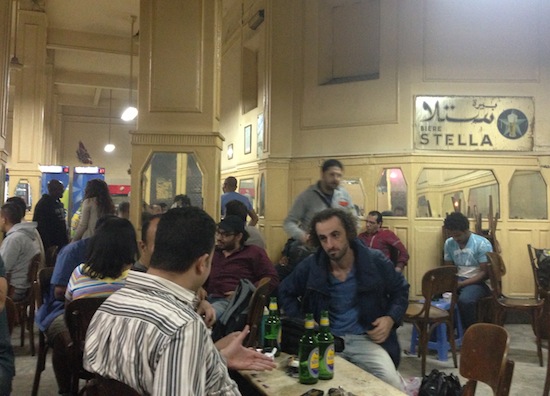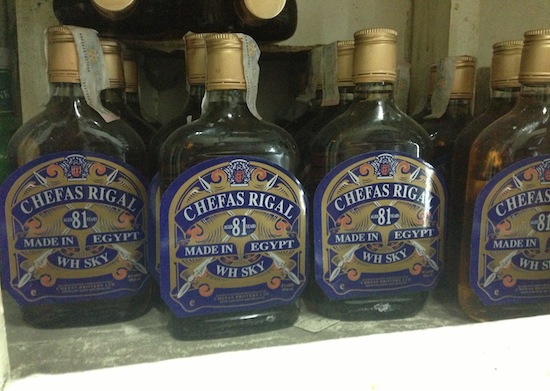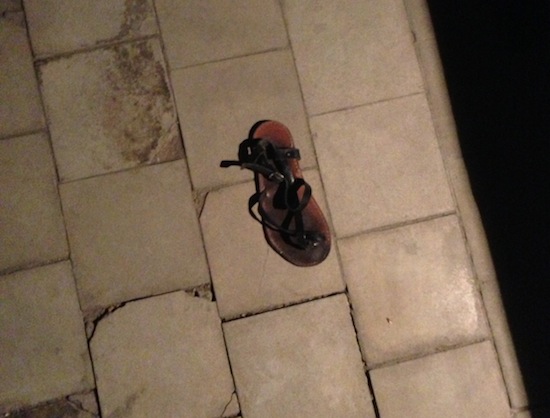Click here to read the rest of the Electro Chaabi In Cairo series, by John Doran
It’s the final day of my stay. I want to hear everything better. Feel everything better. Understand everything better. So I decide to go for an adventure: take a cab with no radio on. With no meter on. And a driver that does not understand English. I enter his cab and at the dashboard there’s a sticker of Bob, the Dutch "don’t drink and drive" campaign. I smile.
It’s the last time I can think about the sonic architecture of Cairo, and how the horns and radios, that sound and that music, fit perfectly into the urban landscape. A cab ride is not a functional cab ride. It’s part of a sound installation with no rules. You’re both participant and listener.
It’s the last time I drive past the big outdoor market full of old Dutch clothes. I recognise stuff. That’s a Stussy sweater from the 90s; there’s that shop with the fake C&A sign again. Suddenly I see a man with a bucket. He’s carefully spreading water over the sand. He can’t do it with too much pressure, otherwise there will be mud, but he has to make the floor wet so his T-shirts won’t get dusty and dirty.
That guy’s actions seem to serve as a metaphor for our whole trip. We did not come to Cairo for dusty things like the Pyramids or the Egyptian Museum. We were not looking for almost-forgotten cassettes. We could have found them. "Very cheap, special price for you, my friend." We could have put them on a blog, and white kids with laptops would have listened to them. Maybe a producer would have even sampled the stuff. But those tapes don’t have any meaning any more in modern Egypt.
Let me be clear: I like those record labels that dig deep and search for African music from the 60s and 70s because those scenes are not that well documented. Those labels are saving those histories for the future.
But: we now know the best things from Lagos and Kinshasa from way back. We often now know more about the context of that music than the musicians who created it and the audience who listened to it. That authentic retro vibe seems quite detached: you only listen to the music, but are not connected to the people, the politics, the dynamics of the scene. It’s like loving punk but being afraid of mosh pits. Loving IDM but being afraid of the original, often black or Latino, gay communities where the roots of those sounds originally emerged from.
You could perhaps argue that this focus on the past has to do with retromania. I don’t agree with that. It’s just an excuse for being afraid of actually being out there. Afraid of creating culture, instead of just consuming culture. Being stuck in middle class concepts from middle class minds that form an easy shield against the real world. It’s the world of acting versus the world of ideas. All those -anias, -isms and –gys are easy codes to stick to. Easy codes that you could reinterpret and deconstruct and overanalyse and… and… and… and… As though you’re watching the post-match analysis, with experts deconstructing exactly what happened, while you’re stuck unable to watch the original game.
We came to Cairo for the here and now action. John and I were looking for the ubiquitous sound of the street, the sound of the youth that forms more than 60% of the population of Egypt, one of the oldest cultures in the world. But also a world almost nobody in the West (except excellent people like DJ/rupture and Ted Swedenburg, who reported on it) seemed to know about.
Why? Perhaps because most of the communication is in Arabic and the sound does not fit to any physical and musical format. Why should a ‘serious’ music journalist pay attention to these guys that work with Auto-Tune and create these weird beats? It’s an aesthetic that’s based on the euro house and commercial hop-hop we despise. Based on Arab rhythms we’re not used to. If a musician like Islam Chipsy sees Shaggy as an influence, perhaps he can’t be taken seriously.
The world has opened now. It’s easier than ever to connect with music scenes from everywhere across the globe. And, especially within those scenes that tend to operate outside of the formal music industry, it’s very easy to directly connect with the people involved. Just send them a message and say you’re interested, and a whole new world opens for you. When Diesel – one of the Electro Chaabi guys – introduced himself to us, he was surprised and almost shy that we already knew him. I hope it encourages him to carry on with doing his crazy stuff.
Why do we know more about what happened in Lagos and in Kinshasa in the past then we know about music scenes from those cities at the moment? We don’t have to search for old tapes to discover those scenes. YouTube is everywhere. And it’s filled with pleasures and treasures that provide you with easy access points from which to dig deeper.
What made this trip so special was that we met so many people. Went to totally different environments. Got confused every day about what Electro Chaabi was/is/might be/will be. Got confused every day about what Egypt was/is/might be/will be. I strongly believe that it will be better than ever, because a new youth culture is developing in this country. Guys whose only future was a service job are now expressing themselves. In clothes. In music. In dancing. In talking. With guys like Sadat, who has a very strong woman as his manager, which was unthinkable before the revolution. I hope they will continue to allow more women in.
People asked us if the scene had to do with the revolution. We learned that was the wrong approach. It’s too one-dimensional: it’s like asking dubstep and grime producers if their music is connected to the London riots, or asking a Dutch musician about cheese, because he’s from a cheese country, so the music has to do with cheese. Of course it has to do with cheese – because he might be eating it. But we often forget that the cheese itself came about as a result of changing social structures.
Electro Chaabi is not only music. Perhaps it’s part of the first Facebook- and Mediafire-driven youth culture in the world. This movement is not political in a traditional, but narrow, Bob Dylan sense. It’s not linear, slowly building on the foundations of the past. Electro Chaabi has all the elements of a disruptive youth movement. Hicham Chadly of the Nashazphone label described it as "new wave". It created a new market and a new value network. The traditional regime wants to stop the voice of the youth with censorship, an army, spies, creating confusion, and all the other elements traditional powers use to prevent change. The networked approach of the Egyptian youth seems to counterattack that regime in a guerilla way: they don’t have TV channels, but they do have YouTube; no political campaigns, but they do have graffiti; and no expensive studios, but cheap software. It helps them to create and express their dreams. To create their own voice. This is no formal party politics, but the practical politics of the public arena.
I’m on the road again. We have to focus. When traffic is not going fast enough, I ask the driver to blow his horn. In the beginning I always had the feeling of being lost and getting lost, but now I feel comfortable. But these guys know what they are doing, and I know what they are doing. So when he asks me for 20 pounds, I tell him that this ride can’t be more than 10 pounds. He agrees.

Today’s plan was to go to a concert by Iron Hands (the new project by Sir Richard Bishop) at 100 Copies, but that changed when Ester Meermans, a Dutch freelance journalist writing Mogwai reviews for the Egyptian media, invited me to a Chaabi roof party. Ester was the one who convinced me to come to Egypt. Two weeks ago a Dutch journalist was arrested for anti-Egyptian propaganda – she had talked to young people about youth unemployment. Then I was afraid, and started to debate whether or not we should go. But Ester insisted that we should come, that Cairo is not more dangerous than Manchester. And she was right.
We meet close to her apartment, in El Horreya, a beer café in Down Town. Not a beer café in the Western sense, where they sell beers of different kinds; when you sit there, they just put a pint of Stella (Egypt’s own beer brand, not imported from Belgium) at your table.
At El Horreya there is a separate area for tea (with its own waiter) and a separate area for beer. The tea area has open windows, while the windows of the beer area are closed with wooden panels. Fridges for soft drinks are with glass; fridges for alcohol are closed, so nobody can see what’s inside. You’re not allowed to be seen drinking alcohol, but everyone does it.
When Ester arrives she tells me why she likes this place: "The beer is cheap. And most of the customer base is gay. There seem to be a lot of revolutionaries, but I never see them." Because most visitors are gay, she never gets approached by young guys who are after ‘something’. We talk about daily life in Egypt. The comic Bassem Youssef (the Jon Stewart of Egypt) will be on TV tonight, so the streets will be empty at 22:30. Deaths through car and motor accidents happen often. And as a freelance journalist you make 30 Egyptian cents a word – such a small amount that a coin for it doesn’t even exist.

We go to a liquor store that sells pirated hard liquors like Chefas Rigal Whsky (sic), buy some bottles of beer, and arrive at a rooftop party in the Garden District – an exclusive neighbourhood where lots of embassies are located.
An old elevator brings us to the third floor, and then we climb a dangerous old set of iron stairs. Expats are dancing ragtime style to swing jazz. They talk about cult movies and cigarettes and journalism; I hear quotes like "most stuff I write is energy" from a Bloomberg reporter. Ester kindly offers to play some Electro Chaabi for me – but that doesn’t seem to make any sense. This is the way these people want to enjoy themselves. Why would I disturb their fun?
"This ending only changes the end of my story," I think to myself. I hoped for distorted noise on a massive PA. A sonic revolution close to Tahrir Square. A rooftop filled with dancing students and young Egyptians from the popular neighbourhoods. Revolutionaries. Expats that would bring this noise to their own countries, like the British already brought the world ‘shabby’ from Egypt to England. But I’m always too romantic about revolutions.
Suddenly I spot a lost slipper on the dance floor. I laugh, and take a picture of it. ‘Fuck! I’ve Lost My Slipper!’ is the title of one of Electro Chaabi’s genre-defining songs, and merely that the song’s maker Amr 7a7a used the lewd term "aha" (‘fuck’) caused a considerable amount of shock. In this context, however, this fucking slipper is simply the lost property of a girl dancing barefoot to old European music.
Now I have my phone in my hand, I send John a text message. "At the rooftop party in the embassy neighborhood we walked through yesterday. With expats dancing ragtime. Those good old colonial days."
Within five minutes he replies. "Take over the decks and put on ‘Fuck! I’ve Lost My Slipper!" I reply by sending him a picture of the slipper, and decide it’s time to leave. The girl puts her slipper on and stops dancing.
Joost Heijthuijsen runs the Incubate Festival, which this year takes place from September 16-22 in Tilburg, The Netherlands. For more information about the festival and this year’s event click here to visit their website.


